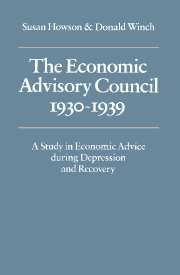1 - INTRODUCTION
Published online by Cambridge University Press: 07 October 2011
Summary
One of the dominant themes of twentieth-century political and economic history has been the assumption by the state not merely of an increasingly wide range of social and economic obligations but of explicit responsibilities in the field of economic management. Connected with this have been changes in the machinery of government, the most significant of which have been the creation of special organs of economic appraisal and advice. There has also been a succession of attempts to establish regular means of collaboration between government and the representatives of industry on matters of economic policy. Since the second world war the official employment of economists in government in this country has become commonplace; and it is no accident that all the important early milestones in the history of economic management in the post-Keynesian sense of the term – the main ones being the creation of the Central Economic Information Service within the Cabinet Office in 1939, the Kingsley Wood budget of 1941, and the White Paper on Employment Policy of 1944 – belong to the second world war. These developments also have an interesting prehistory which belongs to the inter-war period, and the Economic Advisory Council, the subject of this volume, played an important part in that prehistory.
The Economic Advisory Council was established by the second Labour Government in January 1930, and was widely regarded as the brainchild of the Prime Minister, Ramsay MacDonald.
- Type
- Chapter
- Information
- The Economic Advisory Council, 1930–1939A Study in Economic Advice during Depression and Recovery, pp. 1 - 4Publisher: Cambridge University PressPrint publication year: 1977



